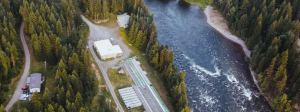
The funding will support ongoing research at the Quesnel River Research Centre in Likely B.C., including infrastructure upgrades. Photo credit: unbc.ca
PRINCE GEORGE – A team of researchers has secured one of the largest competitive grants in University of Northern British Columbia history to study the impacts of climate change and human activity on salmon habitat and ecosystems in the Quesnel watershed and support the raising of Chinook salmon from northern Fraser River stocks.
Led by Department of Geography, Earth and Environmental Sciences (GEES) Professor Dr. Ellen Petticrew and Quesnel River Research Centre (QRRC) Manager Dr. Jason Raine, the research group received $5 million from the British Columbia Salmon Restoration and Innovation Fund (BCSRIF). The funding will support ongoing research into the impacts of drought, flooding and wildfires on salmon habitat, ecosystems and egg survival as well as infrastructure improvements at the QRRC in Likely, B.C.
The BCSRIF is co-funded by both the Government of Canada and the Government of British Columbia and is administered by Fisheries and Oceans Canada. The research team is collaborating with the Upper Fraser Fisheries Conservation Alliance.
“This significant investment from the BCSRIF will enable UNBC researchers to delve deeper into understanding the impacts of climate change on salmon ecosystems and to develop strategies that can help preserve these species for future generations,” says UNBC President Dr. Geoff Payne. “This project exemplifies UNBC’s commitment to inspiring discovery through research and mobilizing that knowledge so it can shape policies and practicises for a sustainable future.”
Construction of a new building at the QRRC site is included in the project, which will provide space for teaching, community outreach and new laboratories.
The funding will support improvements to the hatchery infrastructure, including upgraded wells and electrical services for water supply, additional tanks for broodstock holding and improved early life stage biosecurity in the QRRC incubation room. Hatchery improvements will allow the facility to raise Chinook salmon to help address recent population declines due to the 2019 Big Bar Slide and other natural and human-caused stressors on stocks.
“Salmon are key species in British Columbia, both for the role they play in the ecosystem as a food source and for their cultural value,” says UNBC Vice-President Research and Innovation Dr. Paula Wood-Adams. “Funding from the BCSRIF allows UNBC researchers to continue to explore the impact of climate change on salmon populations and the infrastructure improvements will provide more opportunities for UNBC to expand experiential learning through field schools.”
The research team will study Quesnel Lake’s wind field and water temperatures, enabling a three-dimensional model of lake mixing. These water movements regulate the distribution of nutrients necessary for lower levels of the food web that provide food sources for salmonids and other resident fish. Another focus on drought, flooding, water temperature change and wildfire-contaminated sediment on both salmonid riverine and lake habitats will also inform laboratory experiments on the survival of early life stages of Chinook salmon.
“We have a strong research team, combining backgrounds in physical, chemical and biological aspects of aquatic systems. While this project and funding is focused on the Quesnel watershed, we expect the findings to be applicable to other large lake systems in the Pacific Northwest which are undergoing climate change,” Petticrew says.
The new building will include two laboratories, one wet and one dry, both outfitted with state-of-the-art equipment. It will also include additional office and storage space.
“Opportunities for knowledge exchange, especially with community and First Nations, will be enhanced with the new building,” Raine says. “Research and education on watersheds and key fish species will continue with the legacy of the BSCRIF building, associated facilities and new equipment at the QRRC.”
The funding supports the research of five UNBC faculty and adjunct members (Drs. Stephen Déry, Peter Jackson, Philip Owens, Ellen Petticrew and Jason Raine), one University of British Columbia researcher (Dr. Bernard Laval) and two Fisheries and Oceans Canada research scientists (Drs. Daniel Selbie and Svein Vagle). The project will also involve numerous post-doctoral researchers, graduate students, summer students and research associates. The UNBC Facilities department is coordinating the building’s construction.
Source: UNBC

